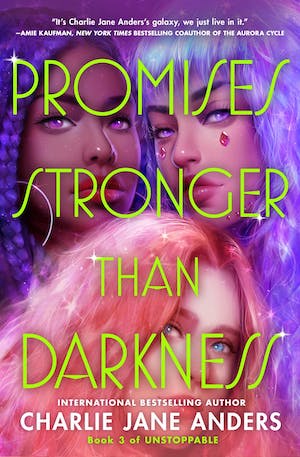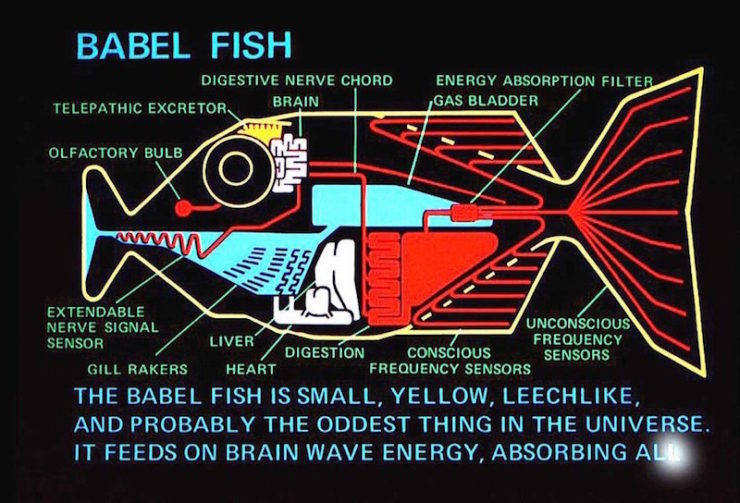Science fiction is full of miraculous technology. You’ve got instantaneous teleportation across great distances, time travel, faster-than-light starships, cryogenic suspension that lasts centuries, and so on. But one of the most fascinating science fiction tropes is the universal translator. (Or, in Hitchhiker’s Guide to the Galaxy, the Babel fish.)
On one level, the universal translator seems like no big deal. After all, Google can now translate dozens of different languages into English with reasonable accuracy, though it does struggle sometimes. And of course, most of the stories we love simply wouldn’t work without a universal translator, because characters would have to spend months—or years—learning a new language, every time they traveled someplace new. That would make Star Trek and Doctor Who a lot less fun.
But at the same time, the notion of instantaneous, flawless translation feels very aspirational. In order to get better at writing Elza, a Brazilian travesti, in my young adult Unstoppable trilogy, I learned to speak and write Portuguese pretty fluently, and it was a huge struggle. So many irregular verbs! Not to mention the overcomplicated conjugations, and all the accents. (Turns out learning a language is harder as you get older; who knew?) Along the way, I learned firsthand that there are serious limits to any kind of automated translation we have now. Google sometimes fails to grapple with the idioms, culturally specific terms, slangy abbreviations, and random stuff that Brazilian Portuguese has. Not to mention false cognates—in our weekly Portuguese lessons over Zoom, my teacher Hailey has become accustomed to saying “No, that’s a false cognate” at least once per session.
This experience left me feeling as though it’s a lot easier to convince yourself that you understand everything that people are saying than it is to actually understand. Come to think of it, that’s kind of true even if everyone is speaking English.
And this led me to thinking that the trope of the universal translator is fundamentally about wishing that understanding other cultures would be simple, and that we didn’t have to work so hard. That we could go on endless voyages and encounter colorful people, and never have to worry about embarrassing gaffes where we announce that we are jelly donuts. (Though apparently, that’s a myth.) In other words, more boldly going, less patiently learning.
Or really, when you get down to it, the universal translator trope is about wishing that everyone spoke perfect English, wherever you go.
Star Trek is often at its most interesting when Starfleet’s finest need to work harder to understand other people. Case in point: “Darmok,” the famous Next Generation episode about the people who speak only in allusions. (Though I always wondered what those allusions were to. Was the story of Darmok and Jalad at Tanagra also written entirely in allusions to earlier stories—and if so, does it just keep going forever? Or is there some ur-story that’s written in a non-allusive language, which everything else is ultimately alluding to?) More recently, on Star Trek: Discovery, the Federation encounters Species 10-C, which is so different that it communicates through emotional hydrocarbons and flashing lights, which the science team has to work hard to translate. I’m also a sucker for films like Arrival, where a visiting alien species communicates in glyphs that actually mess with your awareness of time as you learn to use them.
And then there are always creatures like the Horta, which appear to be unsophisticated animals until we learn how to understand them better.
Given that fictional aliens are often a stand-in for real life cultures here on Earth, this question of how hard we need to work to communicate feels pretty relevant. Especially in TV and movies, the overall effect of a universal translator is that everybody appears to be speaking English, as if everyone in the galaxy has absorbed our culture—even if we know on some level, they’re actually speaking a different language, and we get hints about how their culture differs.
And then… there’s Star Wars. Officially, the Star Wars universe has a kind of lingua franca called Galactic Basic Standard, which most people speak perfectly. (Did all of these species and civilizations have their own individual languages, and were those languages wiped out? I think we never find out.) But now and then, we meet people who speak other languages. Sometimes there are subtitles and sometimes there aren’t—and it appears that George Lucas added subtitles to Jabba the Hutt in the Special Edition of Return of the Jedi. Also, sometimes C-3PO actually gets to fulfill his main purpose and translate alien languages into Standard.
I’m obsessed with the inconsistent subtitle practices in Star Wars. Why do some aliens get subtitles and others don’t? Check out this scene from season one of The Mandalorian, in which Kuiil (Nick Nolte) gets subtitles but the Jawas don’t—even though both Nick Nolte and the Jawas are speaking Jawa to each other:
Still, Star Wars often contains a stock scene in which one character is speaking Standard and the other is speaking some other language, and they seem to understand each other just fine. (e.g., Han Solo and Chewbacca, C-3PO and R2D2, Lando and Nien Nunb.) This is usually played for laughs, because getting to hear one side of an argument is inherently kind of funny, but it’s also a bit strange. How is it that Han Solo understands Chewbacca, but doesn’t speak Wookiee himself? And vice versa? The Star Wars universe is full of people who speak languages passively rather than actively—and you’re left feeling as though it doesn’t entirely matter if we understand the nuances of what some characters are saying. Everyone at least understands English—I mean Standard—after all.
For the Unstoppable trilogy, which ends with the brand-new Promises Stronger Than Darkness, I spent a lot of time poking at the trope of the universal translator. The kids who leave Earth to explore the galaxy come from all over the world, and when they speak Mandarin or Portuguese, the English-speaking Tina doesn’t quite understand their idioms. This comes up a lot in the first two books, until the characters have to wonder how well they’re really understanding the languages that aliens are speaking. After all, if Portuguese is a challenge, how the heck is a machine going to translate a language spoken by someone with a very different type of mouth, who evolved in a very different biosphere?
In Promises Stronger Than Darkness, I go all in on this trope. It’s one of the main things our heroes struggle with, as they learn that building real friendships with aliens is a lot harder than they thought at first. They come to realize that their universal translator, called the EverySpeak, has been designed to make their lives easy rather than helping them understand perfectly. This feels like an inescapable trade-off: comfort versus communication. When they’re faced with a species that has a drastically different physiology and culture, our heroes have to accept that the EverySpeak has been oversimplifying and misrepresenting everything these people have said, from the beginning, and this makes it impossible to be real friends.
I love the notion of the universal translator, because at its core it’s a hopeful ideal: we can all learn to understand each other better. But I also think we need to acknowledge how much work goes into understanding, and how often it goes wrong when we try to take shortcuts in real life. In my books, the characters don’t stop using the EverySpeak. Instead, they reprogram it, hack it, and mess with it, until they’re just a little bit more confused and everyone else is able to speak a little bit more clearly.
And that’s what it comes down to: in addition to offering us miraculous technologies, science fiction also helps us to become more comfortable with being a little bit confused, knowing that making sense of things will be more than worth the effort.
This article was originally published at Happy Dancing, Charlie Jane Anders’ newsletter, available on Buttondown.
Buy the Book


Promises Stronger Than Darkness
Charlie Jane Anders is the author of the young-adult trilogy Victories Greater Than Death, Dreams Bigger Than Heartbreak, and Promises Stronger Than Darkness (which published on April 11, 2023), along with the short story collection Even Greater Mistakes. She’s also the author of Never Say You Can’t Survive (August 2021), a book about how to use creative writing to get through hard times. Her other books include The City in the Middle of the Night and All the Birds in the Sky. Her fiction and journalism have appeared in The New York Times, the Washington Post, Slate, McSweeney’s, Mother Jones, the Boston Review, Tor.com, Tin House, Teen Vogue, Conjunctions, Wired Magazine, and other places. Her TED Talk, “Go Ahead, Dream About the Future” got 700,000 views in its first week. With Annalee Newitz, she co-hosts the podcast Our Opinions Are Correct.










